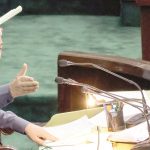As Japan and South Korea continue to deal with North Korean threats and growing concerns about China, the leaders of two neighbours promised to rekindle ties in a fence-mending summit in Tokyo, reported CNN.
Japan’s Prime Minister Fumio Kishida said, “From now on, I would like to open a new chapter in Japan-South Korea relations through frequent visits by both sides that are not tied down by formality.” He made these remarks in Tokyo after meeting with South Korean President Yoon Suk Yeol on Thursday. Leaders of South Korea and Japan haven’t met in 12 years because of strained relations stemming from a wartime labour dispute, and other issues.
A report published in CNN stated that just hours prior to the trip North Korea had launched its fourth intercontinental ballistic missile in less than a year, a long-range ballistic missile, into the waters off the east coast of the Korean Peninsula. This launch served as a stark reminder of the shared security challenges the two countries face.
In the joint statement on Thursday, Kishida said that in response to North Korean nuclear and missile threats, Japan and South Korea had decided to resume bilateral security talks. They also reiterated the significance of the “free and open Indo-Pacific” and their commitment to cooperating to defend the global rules-based order.
Yoon also declared his support for “fully normalising” the military intelligence-sharing pact with Japan.
Yoon said, “I believe the two countries should be able to share information on North Korea’s nuclear missile launches and trajectories and respond to them.”
A long-running dispute about Japan’s use of forced labour during its colonisation of Korea led South Korea to scrap its military intelligence-sharing deal with Japan in 2019, which brought their ties to their lowest point in decades.
According to CNN, the summit between Yoon and Kishida is an essential step towards mending strained relations after decades of disagreements and mistrust plagued the two significant US allies in Asia.
It has been hailed as “an important milestone” in developing bilateral ties by Yoon’s office.
The bitterness between the two East Asian countries dates back to Japan’s colonial rule over the Korean Peninsula a century ago.
Although the two nations’ ties were normalised in 1965, unresolved historical conflicts have persisted, particularly those involving colonial Japan’s use of forced labour and so-called “comfort women” sex slaves.
The United States’ attempts to portray a united front against North Korea in recent years have been undercut by the frequently tense relations, as has Beijing’s increasing aggressiveness.
The US’s two most crucial partners in the region now seem prepared to start over.
Before the meeting, Japan and South Korea decided on Thursday to end a trade dispute that has strained relations for years. This was another gesture of goodwill.
South Korea will withdraw its complaint against these restrictions to the World Trade Organization, and Japan will ease export curbs on high-tech materials used for semiconductors and display panels to South Korea, read a report in CNN.
The rapprochement between the two neighbours is largely motivated by growing security worries about Pyongyang’s increasingly frequent missile tests, China’s more assertive military posture, and tensions across the Taiwan Strait, which both Tokyo and Seoul claim is crucial to their respective security.
Beijing opposes what it terms “the closed and exclusive circle of individual countries,” according to China’s Foreign Ministry, which also expressed the hope that “Japan-South Korea relations will grow in the direction of regional peace, stability, and prosperity.”
The warming ties are good news for Washington, which has been promoting detente.
South Korea’s relations with Japan were “openly confrontational” under Yoon’s predecessor Moon Jae-in, said Joel Atkinson, a professor at Seoul’s Hankuk University of Foreign Studies who specialises in Northeast Asian international affairs.
So, this visit is important and sends a clear message that both sides are now cooperating much more under the Yoon administration, Atkinson added.
Before the crucial action to resolve the historical conflict, Seoul and Tokyo had already shown a willingness to move past the past and develop stronger ties.
On March 1, Yoon stated Japan has “transformed from a military aggressor of the past into a partner” that “shares the same universal values” in a speech marking the 104th anniversary of South Korea’s resistance movement against Japan’s colonial domination, CNN reported. (ANI)








